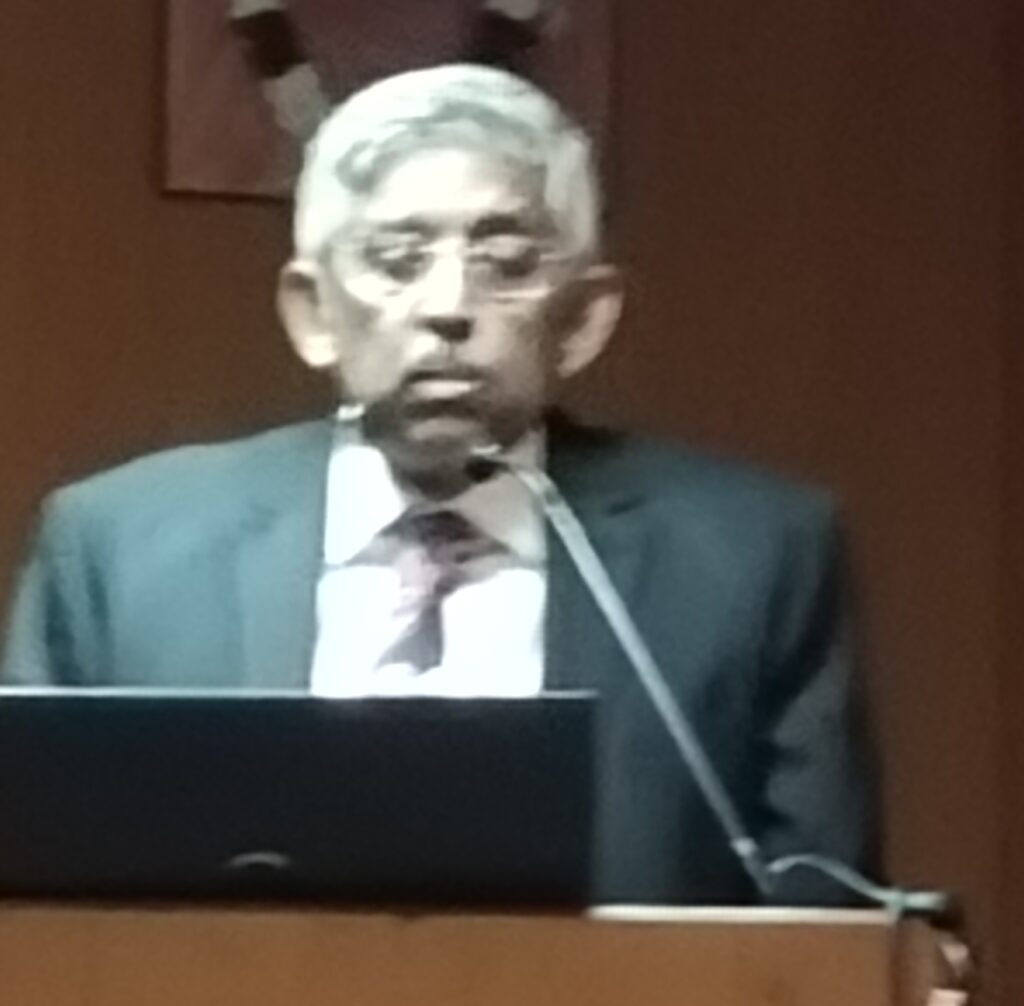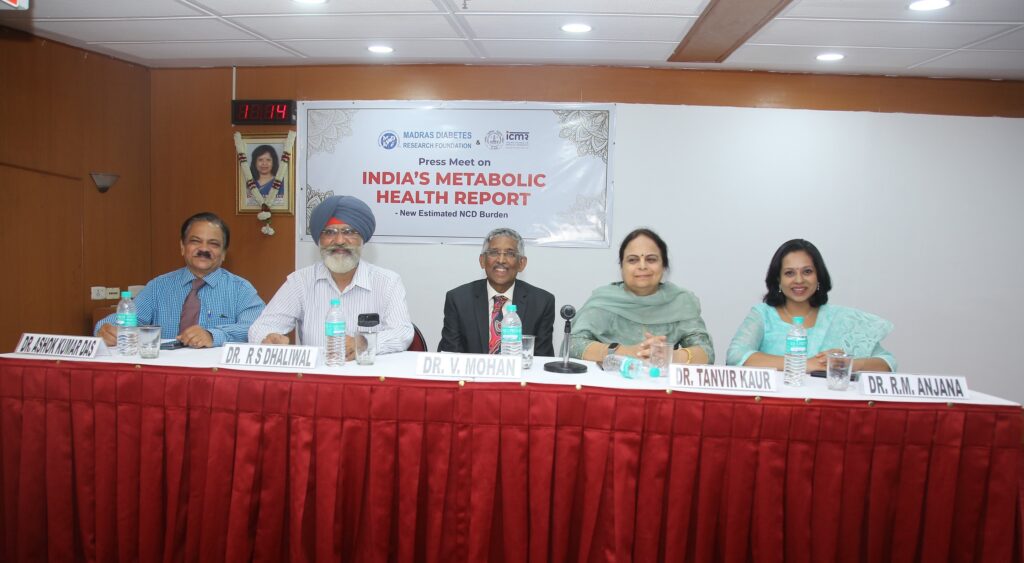Largest epidemiological study on Diabetes and NCDs in India
First comprehensive study covering all the states of india, reveals enormous NCD burden. Urban regions have higher rates of almost all metabolic NCDs compared to rural areas. Wide differences in prevalence of NCDs between states. In more developed states, diabetes prevalence seems to be plateauing off while in less developed ones, further steep rise in prevalence likely.

National, June 8th, 2023: A ground-breaking research paper of a comprehensive epidemiological study funded by ICMR has been published in the globally acclaimed medical journal, The Lancet Diabetes and Endocrinology. Funded by the Indian Council of Medical Research and Ministry of Health and Family Welfare Govt. of India, the study paper-Indian Council of Medical Research-India Diabetes (ICMR-INDIAB) shocking reveals India has a much higher burden of metabolic non-communicable diseases (NCDs) This cross-sectiona population-based survey of adults aged 220 years, sampled a total of 1,13,043 individuals (33,537 urban ar 79,506 rural residents) in 31 States and Union Territories of the country using a stratified, multistage sampli design. In this large representative sample of individuals from both urban and rural India, the study measur the prevalence of metabolic NCDs such as diabetes, hypertension, obesity, and dyslipidaemia. It also identifi

regional and state-level variations in the prevalence of these NCDs across the nation.
Non-communicable diseases (NCDs)
Diabetes
Prediabetes
Hypertension
15.3%
35.5%
Generalized Obesity
Abdominal Obesity
28.6%
39.5%
Hypercholesterolemia
National prevalence
11.4%
ICMR-INDIAB study findings
Estimated
number of people in India, in millions (Burden)
101
136
315
254
351
Goa (26.4%)
Sikkim (31.3%)
Punjab (51.8%)
Mizoram (6.8%)
Meghalaya (24.3%)
Puducherry (53.3%)
Jharkhand (11.6%)
Puducherry (61.2%) Jharkhand (18.4%)
213
State with highest prevalence
24.0%
State with lowest prevalence
Uttar Pradesh (4.8%)
Kerala (50.3%)
exception of prediabetes.
Jharkhand (4.6%)
Urban vs rural difference: Urban regions had higher rates of all metabolic NCDs than rural areas, v
New Notional estimates for diabetes and other NCD’e Our study estimates that in 2021, in india there are 101 million people with diabetes and 136 million people with prediabetes, 315 million people had high blood pressure, 254 million had generalized obesity, and 351 million had abdominal obesity. Additionally, 213 million people had hypercholesterolaemia.
Dr.R.M.Anjana. Managing Director, Dr.Mohan’s Diabetes Specialities Centre (DMDSC) and President, Madras Diabetes Research Foundation (MDRF) commented “We at MDRF are more than proud to be spearheading this herculean task as the national coordinating centre for the study with generous support from ICMR and Ministry of Health, Government of India. The in-depth report is likely to have a huge impact on the healthcare policies for the country specific to NCDs. The findings of this study are very significant as they provide robust estimates of NCDs for the nation. Compared to earlier estimates, India currently has a substantially greater prevalence of metabolic NCDs. In India, the diabetes epidemic is in tronsition, with some states having already reached their peak rates while others are just getting started. The study also demonstrates that despite the fact that all metabolic NCDs ore mare common in urban regions, rural areas have significantly greater prevalence rates than that reported previously
Dr.V.Mohan, Chairman, Dr.Mohan’s Diabetes Specialities Centre (DMDSC) and Madras Diabetes Researc Foundation (MDRF) and senior author of the study added “With dedicated and commendable efforts by the members of MDRF, we have successfully been able to assess the rise in NCDs like obesity, Hypertension an Diabetes which definitely affects millions across the globe. Our study results have multiple implications for t planning and provision of health care in India. State governments in India, who are primarily in charge providing healthcare in their respective regions, will be especially interested in the detailed state-level data these NCDs as it will allow them to develop evidence-based interventions to successfully halt the progress of NCDs and manage their complications.”
Dr.R.S.Dhaliwal, Scientist ‘G’ & Head, Non-communicable Disease Division, Indian Council of Medical Resea (ICMR) and Dr.Tanvir Kaur, Scientist ‘G’, NCD Division, ICMR expressed their delight and honour to have b part of this ICMR-INDIAB study which involved an extensive amount of time, effort and research in con up with research breakthrough. Dr.R.S.Dhaliwal, Scientist ‘G’ & Head, Non-communicable Disease Divi Indian Council of Medical Research states “It is quite evident from the study results that India has a substo population at risk of cardiovascular disease and other long-term organ complications
Being the national coordinating centre for this study, MDRF was involved in this detailed task of planning executing the project successfully. Covering all 28 states, two union territories, and the national capital re of Delhi, the survey was executed an extensive sample size of 1,13,043 individuals. The results of the stud published in the prestigious and globally renowned medical journal The Lancet Diabetes and Endocrinol Please note that this article is embargoed until 23:30 hrs UK time on 7th June 2023.
The post embargo link is given below to access the article. https://www.thelancet.com/journals/landia/article/PIIS2213-8587(23)00119-5/fulltext
About MDRF: The Madras Diabetes Research Foundation (MDRF) is a renowned research ins located in Chennai, India. It is dedicated to conducting scientific research on diabetes and r complications. The foundation was established in 1996 by Dr. V. Mohan, a leading diabetolo India. MDRF’s primary focus is on understanding the causes, prevention, and managem diabetes, as well as its associated complications. The research conducted at MDRF encom various aspects of diabetes, including epidemiology, genetics, clinical management, and health. MDRF plays a crucial role in advancing knowledge about diabetes, improving patien and combating the growing burden of diabetes in India and beyond.